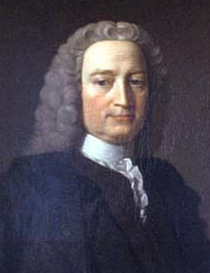| Profile | Major Works | Resources |
Francis Hutcheson, 1694-1746

Francis Hutcheson was a professor of moral philosophy at Glasgow, arguably the father of the Scottish Enlightenment and an early utilitarian thinker.
Francis (or Frances) Hutcheson was born in Armagh, northern Ireland, to a family of Scottish Presbyterian ministers. In 1710, Hutcheson went to study at the University of Glasgow, receiving his degree in 1712 and obtaining his license to preach in 1716. However, there were widespread suspicions about about his "Irish" roots and his association with Glasgow theologian John Simson (then under investigation by Scottish ecclesiastical courts). Hutcheson realized that any ministry he held in Scotland would not likely be a success, so he decided to return to Northern Ireland. About to settle into a small ministry, Hutcheson was induced to try his luck in a new dissenting academy in Dublin. Hutcheson taught for several years there, studying philosophy on the side and marrying into a landed Williamite family.
Roused to indignation by Mandeville's Fable on private vices and public benefits, in 1725, Hutcheson produced his famous Inquiry on our Ideas of Beauty and Virtue. In it, Hutcheson opposed Thomas Hobbes's old thesis that human conceptions of "right" and "wrong", "virtue" and "vice", were rooted not in any theological or natural conceptions but purely in selfish hedonic pleasure and pain calculations. Hutcheson accepted that virtue is associated with pleasure and vice with pain, but tried to avoid Hobbes's conclusion that it all boils down to self-interest. Instead, like Shaftesbury before him, Hutcheson argued that humans have natural and disinterested feelings of benevolence which guide their moral acts and an innate "moral sense" which informs their moral judgments. Inverting Hobbes's thesis, Hutcheson argued that virtue/vice comes first, pleasure/pain afterwards. We experience pleasurable sensations in doing or observing "virtuous" things because anything which complies with our natural benevolence or moral sense automatically yields pleasure. As benevolence involves giving pleasure to others, Hutcheson reaches the famous utilitarian "greatest happiness" formula as a natural moral commandment:
"In comparing the moral Qualitys of Actions, in order to regulate our Election among various Actions propos'd, or to find which of them has the greatest moral Excellency, we are led by our moral Sense of Virtue to judge thus; that in equal Degrees of Happiness, expected to proceed from the Action, the Virtue is in proportion to the Number of Persons to whom the Happiness shall extend; ... so that, that Action is best, which procures the greatest Happiness for the greatest numbers; and that, worst, which, in like manner, occasions Misery." (Hutcheson, 1725: Sect. 3.8)
Hutcheson's theory of aesthetics was set along similar lines to his ethics, e.g. beauty was not a property of the object but arises from an innate "aesthetic sense", and drew parallels for comparison. In a series of articles in James Arbunckle's Dublin journal, Hibernicus's Letters in 1725 and 1726. Hutcheson assaulted Hobbes's theory of "laughter" (which Hobbes asserted to be induced by selfish feelings of superiority to objects of derision) and Mandeville's disturbing Fable directly. This was quickly followed by a duel with Gilbert Burnet ('Philaretus') in the London Journal, which prompted his second great treatise, Essay on the Passions and Affections (1728).
As his fame spread, Hutcheson was invited back to Scotland to take a Chair of Moral Philosophy at the University of Glasgow in 1729, succeeding Gershom Carmichael, his old professor. Hutcheson would remain there until his death in 1746. Hutcheson made Glasgow one of the principal seats of activity during the Scottish Enlightenment, counting Adam Smith and Thomas Reid among his students. He was one of the first academics to lecture in English rather than Latin.
Hutcheson's later works are based on the Moral Philosophy course he taught at Glasgow - a Latin summary of the ethics section Philosphia Moralis (1742), and a more extensive System of Moral Philosophy (published posthumously in 1755 but already circulating before). The System (like the course) was split into four parts: Natural Religion, Ethics, Jurisprudence and Government. Hutcheson's initial lectures on moral philosophy were based on Carmichael's, which drew much from the natural law philosophers Grotius and Pufendorf, but the course eventually evolved distinctly into Hutcheson's own.
In the ethics part, Hutcheson articulated his moral philosophy thesis more explicitly and more directly in opposition to Hobbesian hedonism and Hume's modifications. Adam Smith's TMS tried to reconcile the Hutcheson's "innateness" thesis with Hume's hedonistic doctrine. The latter sections of Hutcheson's System include extensive discussion of economic topics. Hutcheson was not very enthusiastic about the fledgling capitalist system, being highly suspicious of its implications for traditional virtues like benevolence and generosity.
Besides the 'public' moral philosophy course at Glasgow, Hutcheson also taught a 'private' course on ancient theories of ethics and a Sunday evening lecture on evidences of Christianity.
Hutcheson was highly influential upon Adam Smith. When Smith took over Hutcheson's old Moral Philosophy chair at Glasgow in 1752, he kept the same four-part structure and initially used Hutcheson's lecture notes-textbook as the basis of his own course.
|
Major Works of Francis Hutcheson
|
|
HET
|
|
Resources on Francis Hutcheson
|
All rights reserved, Gonçalo L. Fonseca
